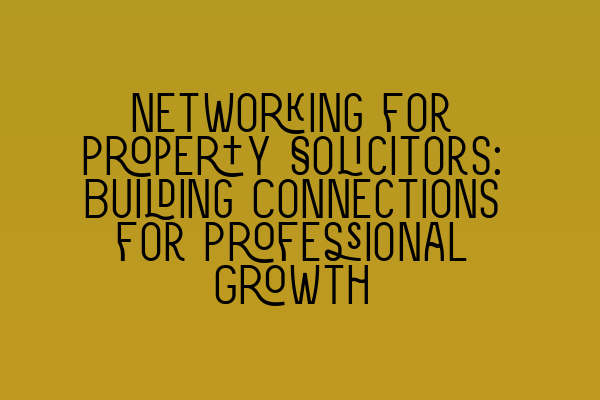Networking for Property Solicitors: Building Connections for Professional Growth
In the competitive world of property law, building a strong network of professional connections is essential for career growth and success. Networking allows property solicitors to meet potential clients, develop referral partnerships, and stay updated on industry trends. It opens doors to new opportunities and can enhance your reputation within the legal community. In this blog post, we will explore the importance of networking for property solicitors and provide practical tips on how to build connections that can fuel your professional growth.
Why Networking Matters for Property Solicitors
Networking is not just about socializing or exchanging business cards; it is a strategic approach to expanding your professional circle and cultivating relationships that can benefit your career. As a property solicitor, your network can include colleagues, clients, fellow legal professionals, industry experts, and potential referral sources. Here are some reasons why networking is crucial in the property law field:
1. Referrals: Building a strong network allows you to tap into referrals from other professionals. When someone in your network comes across a property-related legal issue that is outside their expertise, they are more likely to refer the client to someone they trust and have a connection with.
2. Knowledge Sharing: Networking provides opportunities to exchange ideas, insights, and best practices with other property solicitors. By engaging in discussions and attending industry events, you can stay updated on the latest trends, regulations, and developments in property law.
3. Collaboration and Learning: Networking opens doors to potential collaborations and mentorship opportunities. Establishing relationships with experienced property solicitors can help you learn from their successes and challenges, providing valuable guidance and support as you navigate your own career.
4. Career Opportunities: Many job openings in the legal field are not publicly advertised. Networking allows you to tap into the hidden job market, where referrals and personal connections often play a significant role in securing opportunities.
5. Reputation Building: By actively participating in networking events and discussions, you can establish yourself as a knowledgeable and respected professional in the property law field. This can enhance your reputation and increase your visibility among potential clients and employers.
Tips for Effective Networking in Property Law
Now that we understand the importance of networking, let’s dive into some practical tips to help property solicitors build connections for professional growth:
1. Attend Industry Events: Seek out conferences, seminars, and workshops specifically tailored to property law. These events attract professionals from the field and provide excellent networking opportunities. Make sure to engage in conversations and exchange contact details with fellow attendees.
2. Join Professional Associations: Becoming a member of property law associations and organizations can connect you with like-minded professionals who share your passion for the field. Participate actively in association activities and events to maximize your networking potential.
3. Utilize Online Platforms: In addition to in-person networking, leverage online platforms such as LinkedIn to expand your professional network. Connect with colleagues, clients, and industry leaders, and engage in meaningful discussions related to property law.
4. Offer Your Expertise: Writing articles, blog posts, or even guest speaking at industry events can help you establish yourself as an authority in property law. This can attract the attention of potential clients and referral sources and create networking opportunities.
5. Develop Personal Relationships: Building strong personal relationships with colleagues and clients is essential for networking success. Take the time to understand their needs, offer support, and maintain regular communication. Networking is about building trust and rapport, and personal relationships play a crucial role in this process.
6. Follow Up: After attending networking events or meeting new connections, make sure to follow up promptly. Sending a personalized email or connecting on LinkedIn with a brief note of reminder or thanks can help solidify the connection and keep the conversation going.
7. Be Genuine and Reciprocal: Networking is a two-way street. Be genuine in your interactions, show interest in others, and offer support or assistance whenever possible. Remember to reciprocate and provide help to your connections when they need it.
In conclusion, effective networking is an indispensable tool for property solicitors aiming for professional growth. By building a diverse and supportive network of connections, you can open doors to career opportunities, develop referral partnerships, and enhance your reputation within the legal community. Make networking a priority in your career development strategy and invest time and effort into cultivating meaningful relationships. As you build your network, always remember that networking is not just about what you can gain; it is also about what you can contribute to the success of others.
For more resources and support in your journey as a property solicitor, consider exploring the following articles:
– [SQE 1 Practice Exam Questions](https://fqps.co.uk/sqe/sqe1-preparation/mcq-practice-quiz)
– [SQE 1 Practice Mocks FLK1 FLK2](https://fqps.co.uk/sqe/sqe1-preparation/practice-mocks-quiz)
– [SQE 2 Preparation Courses](https://fqps.co.uk/sqe/sqe2-preparation)
– [SQE 1 Preparation Courses](https://fqps.co.uk/sqe/sqe1-preparation)
– [SRA SQE Exam Dates](https://fqps.co.uk/sqe/sqe1-sqe2-exam-dates)
Remember, networking is not just a one-time effort but a continuous process. With consistency and dedication, you can leverage your network to propel your career forward in the dynamic world of property law.
